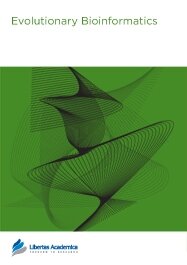

Publication Date: 30 Aug 2011
Type: Methodology
Journal: Evolutionary Bioinformatics
Citation: Evolutionary Bioinformatics 2011:7 123-133
doi: 10.4137/EBO.S7465

Comparative sequence analysis is widely used to infer gene function and study genome evolution and requires proper ortholog identification across different genomes. We have developed a program for the Identification of Orthologs in one-to-one relationship by Neighborhood and Similarity (IONS) between closely related species. The algorithm combines two levels of evidence to determine co-ancestrality at the genome scale: sequence similarity and shared neighborhood. The method was initially designed to provide anchor points for syntenic blocks within the Génolevures project concerning nine hemiascomycetous yeasts (about 50,000 genes) and is applicable to different input databases. Comparison based on use of a Rand index shows that the results are highly consistent with the pillars of the Yeast Gene Order Browser, a manually curated database. Compared with SYNERGY, another algorithm reporting homology relationships, our method’s main advantages are its automation and the absence of dataset-dependent parameters, facilitating consistent integration of newly released genomes.
PDF (767.40 KB PDF FORMAT)
RIS citation (ENDNOTE, REFERENCE MANAGER, PROCITE, REFWORKS)
Supplementary Files 1 (1.82 MB ZIP FORMAT)
BibTex citation (BIBDESK, LATEX)
XML
PMC HTML
This is the fastest progress we have experienced from submission to acceptance. Reviews are fast, pertinent, and instructive. Every step of the process is visible and prompt, and every email is friendly and immediate. In all, it is an excellent experience to be published in Libertas Academica.

All authors are surveyed after their articles are published. Authors are asked to rate their experience in a variety of areas, and their responses help us to monitor our performance. Presented here are their responses in some key areas. No 'poor' or 'very poor' responses were received; these are represented in the 'other' category.See Our Results
Copyright © 2013 Libertas Academica Ltd (except open access articles and accompanying metadata and supplementary files.)
Facebook Google+ Twitter
Pinterest Tumblr YouTube